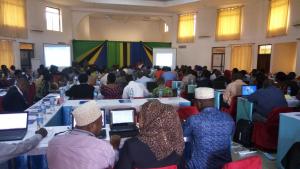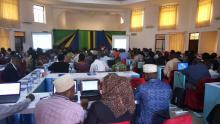Tanzania prepares to provide vaccination against cervical cancer
Dodoma, 22—24 January 2018: Cervical cancer is the second most common cancer in women worldwide. Yet, because of poor access to screening and treatment services, the vast majority of deaths occur in women living in low- and middle-income countries. Cervical cancer is a consequence of a long-term infection with human papillomavirus (HPV). A safe and effective HPV vaccine exists and when provided to young girls between 9 and 13 years old, protects against HPV and therefore cervical cancer.
The Ministry of Health with support of the World Health Organization (WHO) convened 170 Regional Medical Officers, Regional Education Officers, Regional Reproductive and Child Health Coordinators and Regional Immunization and Vaccine Officers to discuss preparations for the introduction of HPV vaccine.
The workshop was also attended by Officials from the Reproductive and Child Health Services (RCHS) and Expanded Programme on Immunization in the Ministry of Health in Mainland and Zanzibar; PORALG; WHO; UNICEF; JSI/MCSP-USAID; Clinton Health Access Initiative and PATH. The purpose of the workshop was to orient participants on the HPV micro planning process and tools; their roles during and after micro planning and guide the Regional teams in the development of a macro plan.
In his opening remarks, the Assistant Director, RCHS, Dr Koheleth Winani, cited the burden of cervical cancer to be the first most common cancer among women in Tanzania and current estimates indicate that more than 7000 women are diagnosed with cancer every year and 58% die from the disease. “In Tanzania, most cases are diagnosed late when the disease is at an advanced stage making it impossible to cure. Tanzania has developed a strategy for cervical cancer prevention which gives emphasis to all levels of prevention. Currently efforts have been made to intensify cervical cancer screening programme and the decision has been made to introduce HPV vaccine”, he said.
On behalf of Dr. Matthieu Kamwa, WR Tanzania, Dr. Anthony Kazoka commended the government’s decision to introduce HPV vaccine in the country aimed at reducing mortality and morbidity caused by the cervical cancer. He stressed on the value of the microplanning exercise and Training of Trainers as part of the preparations for successful roll out of the vaccine.
During the workshop, lessons learnt from the HPV vaccination demonstration project in Kilimanjaro region were shared. These include:
- High level political commitment, social mobilization and sensitization of community are crucial in creating demand of HPV vaccine.
- Community Health Workers are instrumental in reaching out school girls and hard to reach girls.
- Registration of girls before introduction of HPV vaccine makes the vaccination easy and enables tracing those who missed as well those due for second dose.
- The delivery of HPV vaccine into routine immunization is possible and should be in cooperated in Routine Immunization reporting tools and be available at all levels to avoid missing data.
- The distribution of HPV vaccine can be done with other antigens to the districts and health facilities using the existing matrix.
HPV vaccination is planned to begin in April 2018 after accomplishing all the preparations including training of health workers. Gardasil is the vaccine of choice and will be administered in two doses at an interval of 6 months. Vaccination will target 14 year girls in 2018 and 2019; thereafter, the 9 – 14 year group in 2020 and finally a cohort of 9 year old only in subsequent years.
The World Health Organization (WHO) recommends the use of HPV vaccine as the most cost-effective public health measure against cervical cancer, as part of a comprehensive cervical cancer control strategy.




